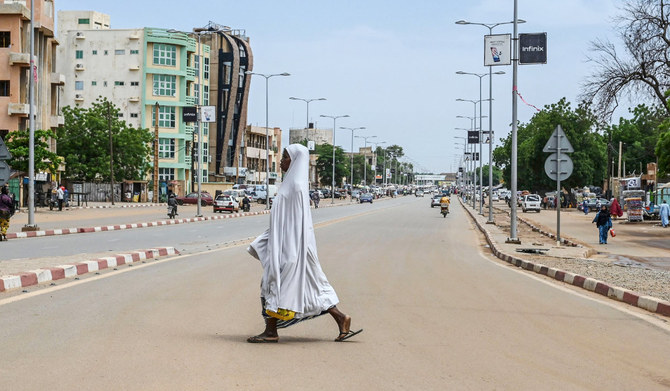NIAMEY, Niger: The coup that shook Niger nearly two weeks ago triggered an international outcry and curbs on domestic freedoms, yet many people in the capital say the change is a breath of fresh air.
Around 30,000 people turned out on Sunday for a rally in a Niamey stadium to support the soldiers who on July 26 toppled Niger’s elected president, Mohamed Bazoum.
For foreign and local critics, the event was a stage-managed show, designed to back the coup leaders in their faceoff with the West African bloc ECOWAS, which is waving the threat of force to reinstate Bazoum.
But within the stadium, and on the streets of Niamey, there were plenty of people who seemed genuinely relieved to see the end of 12 years in government by Bazoum’s Nigerien Party for Democracy and Socialism (PNDS).
“It’s liberation!” said Ousseini Tinni, a mechanic.
“Given the situation that this country has been in for decades, we feel free,” said Alhassane Adamou, an office administrator in the private sector.
Niamey has long been known as a stronghold of the opposition, and domestic critics of the coup and its impact on rights have kept their heads down.
The coup leaders have also announced the suspension of the constitution, banned demonstrations and arrested several of Bazoum’s ministers, although there have not been mass arrests.
In this context, many of the people who spoke to AFP said democracy under the PNDS had been a sham.
“I support the soldiers 100 percent,” said Samaila Abdourahim, a trader.
“Under the old regime, they talked about democracy but it was merely words. We weren’t experiencing a democracy but a dictatorship.”
Bazoum is feted abroad for his election in 2021 that ushered in Niger’s first-ever peaceful transition of power since gaining independence from France in 1960.
But there is often a different view of Bazoum in Niamey, where many people nurse bitterness or disappointment.
They point to the condemnation of opposition leader Hama Amadou to a one-year jail term on charges of child trafficking — a sentence that made him ineligible for the election.
Riots broke out in the capital after Bazoum’s victory that led to two deaths and 468 arrests.
In its 2022 Democracy Index, the Economist Intelligence Unit placed Niger among countries with “authoritarian regimes.”
“We were afraid of expressing ourselves. As soon as you expressed your opinion, they came and arrested you,” said Tinni.
Others spoke out about cronyism, corruption and insecurity that they said had flourished under the PNDS.
“This is what prompted the public to support the putsch,” said Adamou, whose words drew nodding heads of support among the onlookers surrounding him.
Part of the hostility is directed toward France, whose support for Bazoum — a key ally in the French anti-jihadist strategy in the Sahel — is deemed to be proof of complicity.
Ken Opalo, an associate professor at Georgetown University in Washington, drew a parallel between the coup in Niger and military takeovers in neighboring Mali in 2020 and Burkina Faso in 2022.
Foreign allies prioritized “stemming the flows of migrants, accessing natural resources, fighting jihadist(s) in the Sahel so they don’t have to fight them in Western cities, and maintaining overall geopolitical influence in the region,” he wrote in a blog.
“Democracy and economic development have mostly been subordinated to these larger objectives.”
“President Bazoum launched a sincere effort to reform institutions and governance... but his capacity for changing the real practices of the state and its representatives was restricted by the need to balance the political forces that brought him to power,” the International Crisis Group (ICG) think tank said in a report on Monday.
The question is whether General Abdourahamane Tiani, Niger’s latest strongman and a reputed confidant of former president Mahamadou Issoufou, will change things.
According to an opinion poll published in March 2022 by the survey firm Afrobarometer, more than half of the Nigeriens interviewed said they were dissatisfied with the functioning of democracy.
However, 61 percent said they preferred democracy to other forms of government — and 84 percent opposed dictatorship.
“If the military start to turn into politicians, we will rise up against them,” said Abdourahim.
“If we tolerate them today, it’s because it’s in our interest for them to be there. Because now, it’s us, the people, who will be making the decisions.”

























